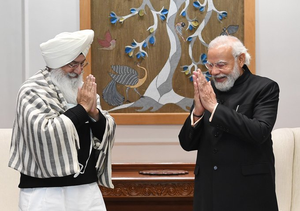‘Deras’ in Punjab, Haryana play decisive role in final outcome of polls
By IANS | Published: May 15, 2024 10:39 AM2024-05-15T10:39:37+5:302024-05-15T10:40:05+5:30
Chandigarh, May 15 As electioneering for the parliamentary polls in Punjab and Haryana is yet to enter the ...

‘Deras’ in Punjab, Haryana play decisive role in final outcome of polls
Chandigarh, May 15 As electioneering for the parliamentary polls in Punjab and Haryana is yet to enter the crucial phase, almost all major players, the Congress, the Bharatiya Janata Party (BJP), the Shiromani Akali Dal, the Indian National Lok Dal (INLD) and the debutants to politics, the Aam Aadmi Party (AAP) and the Jannayak Janta Party (JJP), have turned to religious sects, seeking votes in the name of religion, caste and creed.
In Punjab, religion is nothing new to politics. Rather, it has always been an integral part of state politics. Sikhs, the majority community, believe the Akal Takht, the highest temporal seat of the Sikh religion, draws its inspiration from the sancta sanctorum, the Golden Temple.
The Akali Dal, once the major partner of the BJP, also controls the Sikh religious Parliament called the Shiromani Gurdwara Parbandhak Committee (SGPC).
The Akali Dal claims itself to be the ‘panthic’ party, meaning the Sikh religious voice.
The Chief Ministers of Punjab, Haryana and Himachal Pradesh are among the prominent leaders who frequent ‘deras’ several times, especially during the elections -- be it parliamentary or the assembly.
‘Dera’ is a term used to refer to the guru-led religious organisations.
There are six major ‘deras’ in Punjab. They are Dera Sacha Sauda, Radha Soami Satsang Beas, Noormahal Dera (Divya Jyoti Jagriti Sansthan), Sant Nirankari Mission, Namdhari Sect and Dera Sachkhand Ballan.
However, major deras like Radha Soamis, Nirankaris and Namdharis generally stay away from politics and elections. But politicians keep on calling their heads to woo their followers.
Unlike them, Dera Sacha Sauda’s controversial self-styled godman, Gurmeet Ram Rahim Singh, is known for issuing a public appeal, officially or unofficially, to vote for a particular party. Gurmeet Ram Rahim has been released on parole or furlough on multiple occasions in the recent past by the state BJP government before important polls in Haryana or adjoining states.
Headquartered near Sirsa town in Haryana, Dera Sacha Sauda wields influence in Punjab’s Malwa belt -- the state’s largest region that accounts for 69 of the state’s 117 assembly seats.
Ram Rahim, a convict in rape and murder cases, is currently lodged at Rohtak’s Sunaria Jail.
In Haryana, Himachal Pradesh and Rajasthan too, its followers run into several lakhs.
Several top politicians from the region had been calling the self-proclaimed godman before his conviction to seek blessings and support. Even on parole, they used to flock to seek blessings.
Ram Rahim has been serving a 20-year sentence for the rape of his female disciples since August 25, 2017, and two subsequent life sentences for the murder of journalist Ram Chander Chhatrapati and former Dera manager Ranjit Singh.
In January, Ram Rahim Singh walked out of jail for the seventh time in the past two years, and the ninth since his conviction. In 2022 and 2023, he came out of jail on six occasions.
“No election in Punjab and Haryana is complete without the sects that influence the votes of followers. Be it the Akali Dal, Congress or the BJP, everyone lines up to seek blessings of sect chiefs owing to their political influence, despite drawing the ire of Sikh hardliners to a particular sect,” a political observer told IANS.
Several radical Sikh bodies have been opposing the sects, labelling them pseudo-sects primarily anti-Sikh. Recalling the edicts against these sects by the Akal Takht, the radicals have been asking the parties to stay away from the cults.
The Radha Soami Satsang Beas is another prominent sect with its mass base in Amritsar, Jalandhar, Patiala, Muktsar, Kapurthala, Kotkapura and Fazilka districts of Punjab and in adjoining Haryana, Himachal Pradesh and Rajasthan. It has the maximum following in dollar-rich Doaba, also the stronghold of Dalit politics in Punjab. This region sends 23 legislators.
Currently, scores of candidates from most of the prominent parties are calling on Radha Soami Satsang Beas Chief Gurinder Singh Dhillon, popularly known as Baba-ji, at his residence in Beas in Amritsar district to receive blessings.
Ahead of polls in Punjab, Uttar Pradesh, Uttarakhand, Goa and Manipur in February 2022, a circular was issued by the headquarters to all Radha Soami Satsang centres, saying, “respect for all political parties as all are equal for us.”
Ahead of the Punjab assembly polls in February 2022, Union Home Minister Amit Shah met the chief of Radha Soami Satsang Beas, Baba Gurinder Singh Dhillon, at Beas, around 45 km from Amritsar. In the same month, Prime Minister Narendra Modi met Gurinder Singh Dhillon in Delhi and also praised the spiritual organisation for its social service.
In the run-up to Himachal Pradesh polls in November 2022, Modi visited the Radha Soami Satsang and met its head.
The other big vote bank for political parties is the Dera Sachkhand Ballan, a prominent Ravidassia community sect that has much influence in the Doaba region comprising Jalandhar, Hoshiarpur, Nawanshahr and Kapurthala districts of Punjab. They constitute 32 per cent of the total vote bank.
From BJP candidate Sushil Kumar Rinku to Congress’ Charanjit Singh Channi to AAP’s Pawan Kumar Tinu recently paid obeisance to the sect, which has never shown any political tilt or affiliation.
“In politics, not everything can be left in the hands of the electorate. It is the god-men that play a decisive role in the final outcome of polls,” added another observer.
(Vishal Gulati can be contacted at gulatiians@gmail.com)
--IANS
vg/dan
Disclaimer: This post has been auto-published from an agency feed without any modifications to the text and has not been reviewed by an editor
Open in app